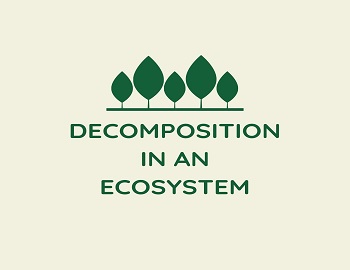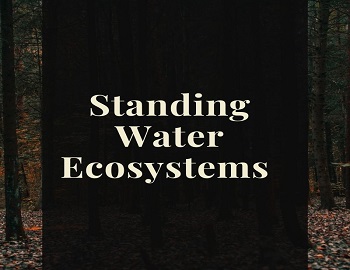Table of Contents
Decomposition in an Ecosystem:
Decomposition is the process that is concerned with the breakdown of complex organic matter by decomposers to inorganic raw materials like carbon dioxide, water and various nutrients. The upper layer of soil is the main site for decomposition processes in the terrestrial ecosystem. In aquatic bodies, it is the bottom portion (Benthic Zone) where the process of decomposition occurs.
Process of Decomposition:
Dead remains of plants and animals are called detritus. In a terrestrial ecosystem, dried parts of plants such as leaves, bark, flowers etc. and dead remains of animals, their faecal matter fall on the surface of the earth to constitute litterfall or above-ground detritus. Dead roots of plants below the surface of soil constitute the below-ground detritus.
The decomposition is a complex, enzymatic process that involves step-wise degradation of detritus. It involves following three steps which operate simultaneously on detritus-
- Fragmentation of Detritus- This process takes place, mainly due to the action of detritus feeding invertebrates, also known as detrivores, where detritus is broken into smaller particles. Here, the detritus is pulverised, when passes through the digestive tracts (alimentary canals) of animals. Due to this process, the surface area of detritus particles is greatly increased.
- Leaching Action- Soluble substances such as sugars and several nutrients from the fragmented detritus particles get dissolved in water percolating through soil and are removed due to leaching action.
- Catabolism- Bacteria and fungi secrete extracellular enzymes to break detritus into simpler compounds and inorganic substances.
Besides the above-mentioned decomposition processes, humification and mineralization occur during decomposition in the soil-
- Humification- is the formation of humus during decomposition in the soil. It leads to the accumulation of a dark coloured amorphous substance called humus. It is highly resistant to microbial action and undergoes extremely slow decomposition.
- Mineralization- refers to the formation of minerals during the process of decomposition in the soil. It serves as a reservoir of nutrients. Mineralization results in the release of inorganic substances and available nutrients in the soil.
Significance of the Process of Decomposition:
The process of decomposition is vital in any ecosystem because-
- It helps in decomposing the dead plants and animals into other useful substances like ammonia and nitrate etc. which act as fertilizers for enriching the soil fertility.
- Decomposers act as cleaning agents because they decompose the wastes and dead bodies of plants and animals. If decomposition is stopped, large amounts of partially decomposed organic matter shall accumulate in the ecosystem.
Factors affecting the rate of Decomposition:
- Temperature- Detritus decomposes very rapidly within a few weeks or months in a climate characterized by higher temperature (more than 25°C) and moist conditions i.e. in humid tropical regions. Low temperature (less than 10°C) sharply reduces decomposition rate even if moisture is in plenty. Therefore, complete decomposition of detritus may require several years in regions of high latitude or altitude. In tropical deserts, if the soil remains dry for a long time, the decomposition rate becomes low even if the temperature of the area remains high.
- Soil Moisture- Decomposition rate is slow under prolonged soil dryness even if the temperature remains high. High soil moisture fastens the decomposition rate.
- Accumulation of substances- The relative proportions of water-soluble substances including sugars, polyphenols, lignin and nitrogen determine the chemical quality of detritus. Under the same climatic conditions, the decomposition rate is slower if the detritus is rich in substances like lignin and chitin. The nitrogen-rich detritus having low amounts of lignin decomposes relatively rapidly.









Comments (No)